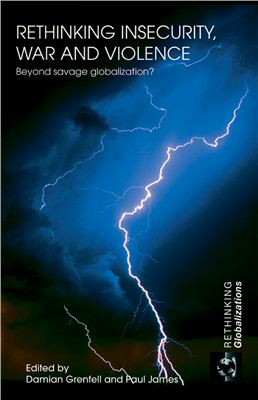Routledge, 2009. 233 p.
Rethinking Insecurity, War and Violence: Beyond savage globalization? is a collection of essays by scholars intent on rethinking the mainstream security paradigms.
Overall, this collection is intended to provide a broad and systematic analysis of the long-term sources of political, military and cultural insecurity from the local to the global. The book provides a stronger basis for understanding the causes of conflict and violence in the world today, one that adds a different dimension to the dominant focus on finding proximate causes and making quick responses
Too often the arenas of violence have been represented as if they have been triggered by reassertions of traditional and tribal forms of identity, primordial and irrational assertions of politics. Such ideas about the sources of insecurity have become entrenched in a wide variety of media sources, and have framed both govement policies and academic arguments. Rather than treating the sources of insecurity as a retreat from modeity, this book complicates the pattes of global insecurity to a degree that takes the debates simply beyond assumptions that we are witnessing a savage retu to a bloody and tribalized world.
It will be of particular interest to students and scholars of inteational relations, security studies, gender studies and globalization studies.
Globalizing insecurity.
Debating insecurity in a globalizing world: an introduction.
Globalization and the changing face of war.
Globalization and the limits of current security paradigms.
Global capitalism and the production of insecurity.
Reconceptualizing security.
New wars and the therapeutic security paradigm.
Beyond the construction of consent in the War on Terror.
Environmental security, climate change, and globalizing terrorism.
Recasting Weste knowledges about (postcolonial) security.
Rethinking localized transnational conflicts.
Zones of conflict and the global War on Terror.
Political regimes in Southeast Asia and the War on Terror.
Insecurity, risk, identity and violence in Kosovo.
Beyond Ethnocracy and conflict in Israel/Palestine? .
Renewal in the aftermath of violence.
Goveance: rule and reconstruction after war.
Reconciliation: violence and nation formation in Timor-Leste.
Recovery: taming the rwa bhineda after the Bali bombings.
Resilience: wantoks, transnational traders and global politics.
Rethinking Insecurity, War and Violence: Beyond savage globalization? is a collection of essays by scholars intent on rethinking the mainstream security paradigms.
Overall, this collection is intended to provide a broad and systematic analysis of the long-term sources of political, military and cultural insecurity from the local to the global. The book provides a stronger basis for understanding the causes of conflict and violence in the world today, one that adds a different dimension to the dominant focus on finding proximate causes and making quick responses
Too often the arenas of violence have been represented as if they have been triggered by reassertions of traditional and tribal forms of identity, primordial and irrational assertions of politics. Such ideas about the sources of insecurity have become entrenched in a wide variety of media sources, and have framed both govement policies and academic arguments. Rather than treating the sources of insecurity as a retreat from modeity, this book complicates the pattes of global insecurity to a degree that takes the debates simply beyond assumptions that we are witnessing a savage retu to a bloody and tribalized world.
It will be of particular interest to students and scholars of inteational relations, security studies, gender studies and globalization studies.
Globalizing insecurity.
Debating insecurity in a globalizing world: an introduction.
Globalization and the changing face of war.
Globalization and the limits of current security paradigms.
Global capitalism and the production of insecurity.
Reconceptualizing security.
New wars and the therapeutic security paradigm.
Beyond the construction of consent in the War on Terror.
Environmental security, climate change, and globalizing terrorism.
Recasting Weste knowledges about (postcolonial) security.
Rethinking localized transnational conflicts.
Zones of conflict and the global War on Terror.
Political regimes in Southeast Asia and the War on Terror.
Insecurity, risk, identity and violence in Kosovo.
Beyond Ethnocracy and conflict in Israel/Palestine? .
Renewal in the aftermath of violence.
Goveance: rule and reconstruction after war.
Reconciliation: violence and nation formation in Timor-Leste.
Recovery: taming the rwa bhineda after the Bali bombings.
Resilience: wantoks, transnational traders and global politics.

